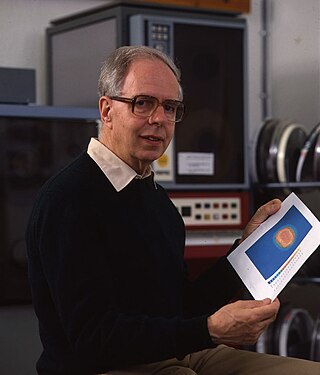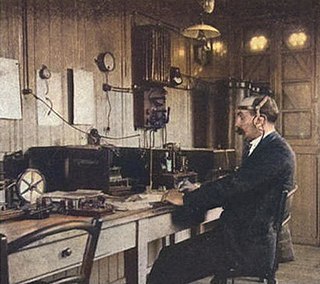The hertz (symbol: Hz) is the SI derived unit of frequency.
Contents
Hertz may also refer to:
The hertz (symbol: Hz) is the SI derived unit of frequency.
Hertz may also refer to:

Frequency, most often measured in hertz, is the number of occurrences of a repeating event per unit of time. It is also occasionally referred to as temporal frequency for clarity and to distinguish it from spatial frequency. Ordinary frequency is related to angular frequency by a factor of 2π. The period is the interval of time between events, so the period is the reciprocal of the frequency: T = 1/f.

Heinrich Rudolf Hertz was a German physicist who first conclusively proved the existence of the electromagnetic waves predicted by James Clerk Maxwell's equations of electromagnetism. The SI unit of frequency, the hertz (Hz), is named after him.

The hertz is the unit of frequency in the International System of Units (SI), often described as being equivalent to one event per second. The hertz is an SI derived unit whose formal expression in terms of SI base units is s−1, meaning that one hertz is one per second or the reciprocal of one second. It is used only in the case of periodic events. It is named after Heinrich Rudolf Hertz (1857–1894), the first person to provide conclusive proof of the existence of electromagnetic waves. For high frequencies, the unit is commonly expressed in multiples: kilohertz (kHz), megahertz (MHz), gigahertz (GHz), terahertz (THz).
Drift or Drifts may refer to:

In atomic physics and chemistry, an atomic electron transition is an electron changing from one energy level to another within an atom or artificial atom. The time scale of a quantum jump has not been measured experimentally. However, the Franck–Condon principle binds the upper limit of this parameter to the order of attoseconds.
Receiver or receive may refer to:

Gustav Ludwig Hertz was a German experimental physicist and Nobel laureate in Physics for his work on inelastic electron collisions in gases.
Terahertz or THz may refer to:

Carl Hellmuth Hertz was a German physicist known primarily for being involved in the development of inkjet technology and ultrasound technology. He was the son of Gustav Ludwig Hertz and great nephew of Heinrich Hertz.

James Franck was a German physicist who won the 1925 Nobel Prize for Physics with Gustav Hertz "for their discovery of the laws governing the impact of an electron upon an atom". He completed his doctorate in 1906 and his habilitation in 1911 at the Frederick William University in Berlin, where he lectured and taught until 1918, having reached the position of professor extraordinarius. He served as a volunteer in the German Army during World War I. He was seriously injured in 1917 in a gas attack and was awarded the Iron Cross 1st Class.

The Franck–Hertz experiment was the first electrical measurement to clearly show the quantum nature of atoms. It was presented on April 24, 1914, to the German Physical Society in a paper by James Franck and Gustav Hertz. Franck and Hertz had designed a vacuum tube for studying energetic electrons that flew through a thin vapor of mercury atoms. They discovered that, when an electron collided with a mercury atom, it could lose only a specific quantity of its kinetic energy before flying away. This energy loss corresponds to decelerating the electron from a speed of about 1.3 million metres per second to zero. A faster electron does not decelerate completely after a collision, but loses precisely the same amount of its kinetic energy. Slower electrons merely bounce off mercury atoms without losing any significant speed or kinetic energy.

Alexander Stepanovich Popov was a Russian physicist who was one of the first people to invent a radio receiving device.

A spark-gap transmitter is an obsolete type of radio transmitter which generates radio waves by means of an electric spark. Spark-gap transmitters were the first type of radio transmitter, and were the main type used during the wireless telegraphy or "spark" era, the first three decades of radio, from 1887 to the end of World War I. German physicist Heinrich Hertz built the first experimental spark-gap transmitters in 1887, with which he proved the existence of radio waves and studied their properties.

The invention of radio communication was preceded by many decades of establishing theoretical underpinnings, discovery and experimental investigation of radio waves, and engineering and technical developments related to their transmission and detection. These developments allowed Guglielmo Marconi to turn radio waves into a wireless communication system.
Ohm is a unit of electrical resistance named after Georg Ohm.
Sick may refer to:
The timeline of radio lists within the history of radio, the technology and events that produced instruments that use radio waves and activities that people undertook. Later, the history is dominated by programming and contents, which is closer to general history.

Georg Wilhelm Alexander Hans Graf von Arco was a German physicist, radio pioneer, and one of the joint founders of the "Society for Wireless Telegraphy" which became the Telefunken company. He was an engineer and the technical director of Telefunken. He was crucial in the development of wireless technology in Europe.

The 52-hertz whale, colloquially referred to as 52 Blue, is an individual whale of unidentified species that calls at the unusual frequency of 52 hertz. This pitch is at a higher frequency than that of the other whale species with migration patterns most closely resembling the 52-hertz whale's – the blue whale and the fin whale (20 Hz). Its call has been detected regularly in many locations since the late 1980s and appears to be the only individual emitting a whale call at this frequency. However, the whale itself has never been sighted; it has only been heard via hydrophones. It has been described as the "world's loneliest whale", though potential recordings of a second 52-hertz whale, heard elsewhere at the same time, have been sporadically found since 2010.
Hertz is an Anglicized name of German origin, with 'herz' literally meaning 'heart' in English. This alternate spelling of 'Herz' with an additional 't' primarily arose during the 19th and 20th centuries as German-speaking immigrants travelled to English-dominant regions like North America. 'Hertz' was easier to pronounce in English, and approximated the proper German pronunciation of the word. It is primarily a surname but it has also been used as a given name. Notable people with the name include: